Royals, Obamas and the End of the $100M Vanity Deal
Starting in 2018, streaming cash rained on the world's two most famous couples. The challenge? Neither had ever produced any Hollywood content

At 8 a.m. EST on Tuesday Aug. 23, digital billboards lit up in Times Square and across Los Angeles, Toronto and Sydney. The displays featured a stunning black-and-white image of Meghan Markle, the Duchess of Sussex. Dressed in a simple, J. Crew white tank top, Markle had the natural, unvarnished quality of a Dove commercial, with her long, dark hair falling loosely around her face.
Aside from the billboards, and some social media messaging from Spotify, nothing else announced the arrival of Markle’s long-awaited Spotify podcast series, Archetypes with Meghan. The show’s first episode launched simultaneously with the billboards, featuring a conversation between Markle and Serena Williams. The effect was a surprise media-drop equivalent of Beyoncé’s Lemonade.
It was a bold move for Markle, 41, and the production company, Archewell Productions, which she runs with Prince Harry, 37. Archewell, of course, was part of the couple’s post-Royal Family reincarnation as media moguls in the U.S. Since relocating to the lush seaside enclave of Montecito, in a 9-bedroom, 16-bathroom, $19 million manse, they have signed a slew of book, podcast and movie and TV deals as they set about defining their new roles as frenemies of the Crown.
But the unorthodox release of Archetypes was also, perhaps, a necessary move for Markle and Co. Until Tuesday, the running refrain in the entertainment industry about the company was: where is the product? The couple’s $25 million Spotify deal, inked in December of 2020, had only yielded a single Christmas episode until this week. As for their deal with Netflix, also signed in 2020 and worth a reported $100 million — almost as much as veteran mega-producer Shonda Rhimes’ Netflix’s package — there have yet to be any movies, documentaries or TV shows.
Indeed, the biggest news generated on that front was in May when Netflix canceled Archewell’s animated TV series Pearl, which had been a passion project of Markle’s. The news set off “a fire alarm at Archewell,” says an Archewell insider, not authorized to speak on the record. “Harry and Meghan called an all-hands meeting. They were deeply concerned about the optics of this. Meghan wanted to talk to Ted [Sarandos, co-CEO of Netflix].”
Another Archewell source says there was never any conversation with Sarandos nor any “special treatment” over the issue. (No flowers, no call, etc.) This person also denies that the meeting Markle convened had a 911-emergency tone.
Both Netflix and Spotify declined to comment for this story.
The carefully engineered arrival of Archetypes — which, by all counts, was positively received in its first 24 hours — points to the growing pressure that so-called vanity deals like Archewell’s face in Hollywood’s new economic reality of 2022. This is particularly true at digital mega-unicorns such as Spotify and Netflix, neither of which is operating by the same rules as they were two years ago when both went on tentpole deal benders with celebrity influencers. Both are dearly dependent on subscriber acquisition and retention for profit margins. So who better than the world’s glossiest faces to deliver that — right? Right?
Slash and Burn
Netflix’s cancellation of Pearl was part of a larger slash-and-burn effort underway at the company on the heels of its disastrous Q1 subscriber report. The show’s demise is a sign of how drastically things have changed at Netflix and Hollywood in a matter of months (Netflix’s subsequent Q2 numbers revealed the first time U.S. subscriber numbers also dropped). Since the company’s single-day $60 billion drop in market value in April, the entire entertainment sector has been dragged down with it. And now it’s not just Netflix canceling projects (and jobs) — Warner Bros. Discovery is slashing and burning everything from Batgirl to J.J. Abrams’ Batman project (the mega-producer’s own $500 million deal is believed to be a particular sore point for CEO David Zaslav, who inherited the contract).
Indeed, the lingering Archewell deal reflects the good ol’ days in this business, but no more so than at Netflix, which became famous for multi-million-dollar overall deals that combined schmoozing for Sarandos with a sexy headline (the premium paid for Sarandos’ pet projects is said to have became known internally as “the Ted tax”). Sarandos — whose wife, Nicole Avant, was ambassador to the Bahamas under former President Obama — also had welcomed Mr. and Mrs. O into the Netflix fold in another lavish deal, reported to be in the high eight figures, two years before the Sussexes (even though they too had no Hollywood experience).
Like Archewell, the Obamas’ Higher Ground productions blazed into Hollywood with noble intentions. Said the President when the 2018 deal was announced: “We hope to cultivate and curate the talented, inspiring, creative voices who are able to promote greater empathy and understanding between peoples, and help them share their stories with the entire world.”
Turns out the mission of promoting empathy between people, at least in 2022, is as hard to accomplish as streaming’s full revolution itself.
‘What Have They Done Lately?’
Eight traffic-clogged miles down the road from Netflix are the Los Angeles offices of Spotify. The music streamer made deals with Archewell and Higher Ground, the two highest-profile companies to ride the rich, money-sloshing days of early streaming. Spotify’s land grab came when Dawn Ostroff, a popular senior executive from the worlds of TV and Condé Nast, joined in 2018 as the company’s first-ever chief content officer (she is now chief content and advertising business officer). It was all part of a push by CEO Daniel Ek to move the company into something maybe more lucrative (or maybe not, as it turned out) than music streaming, where the company makes less than half a cent per stream, and where the company has to shell out rich payouts for music royalties (in 2021, the bill was $7 billion).
Immediately, swiping a page from the entertainment world from whence she came, Ostroff launched a ferocious “tentpole” spree, signing Joe Rogan exclusive to the platform, and spreading the gospel in glossy stories for Rolling Stone and Elle, all while announcing deals with Kim Kardashian and Bill Simmons. Podcasts were the next frontier, and no one was more in the Zeitgeist than the Sussexes (about to Megxit the U.K.) and the Obamas (wearing their post-White House glow), whom Ostroff personally courted by flying to Washington, D.C. to make the pitch. Both couples were signed to multi-million deals, each worth $25 million to be exact.
But at both Netflix and Spotify, whose stocks are down 67 percent and 69.5 percent from their highs, respectively, it’s hard not to wonder if these and other VIP deals were more reckless than fearless in hindsight. Four years into its podcast spree, Spotify has only housed one bonafide hit that’s exclusive to its platform: The Joe Rogan Experience. Many of those other splashy headline-making deals have failed to produce the amount of content that would justify their hefty pay days (Kim Kardashian) — if they even exist at all anymore (Ava DuVernay and the Duplasses are among those said to have walked away from their deals). More, podcasting accounted for just 7 percent of total listening hours in the first quarter of 2022, and 2 percent of revenue last year. Indeed, in Phase 2 of the Streaming Wars, no one seems safe anymore, and the chatter around Hollywood is what deals will be cut, or at least left to drift away to find another home like Disney or Amazon. (Abrams, of course, and Ryan Murphy are among those with constant whispers.)
Signs of the new order are already underway. The once untouchable Obamas announced their intent to depart from Spotify in late April (they’re under contract until October) — sparking as many headlines as their arrival at the company. (They have since struck a deal with Amazon’s Audible.) At Netflix, Higher Ground gained acclaim early for notable documentaries, but is still evolving in the narrative space. As for Archewell, though there is talk of projects coming down the pipeline, there has been no Archetypes-level launch.
“Everyone thinks they’re well-intentioned,” says one publicist. “The question around town is output. What have they done lately?”
‘Under Their Spell’
To be clear, once the vanity surface is scratched, Archewell and Higher Ground are two distinctly different companies. From the get-go, the Obamas set up a staff at Higher Ground of well-respected Hollywood executives — including Priya Swaminathan, a “cool kid” executive who moved from Annapurna and had worked with Spike Jonze; and Tonia Davis, a no-nonsense veteran of Disney and Chernin Entertainment who made smart bets on solid projects at Higher Ground in the doc space. (Swaminathan has since departed, leaving Davis in charge of film and TV. Joe Paulsen, President Obama’s former deputy chief of staff, now heads business and strategy.) The company shrewdly leveraged Obama star wattage to get things done, a strategy that worked wonders given that the Saint Obama halo was still glowing with a post-presidency vengeance when Higher Ground was formed.
Josh Braun, the co-president of Submarine Entertainment, brokered the sale of the Participant Media-produced documentary American Factory — about a Chinese company that takes over a shuttered Detroit factory and the culture clash that ensues — to Higher Ground at Sundance in 2019. During the meeting in Park City where the sale was finalized he recalls, “an executive at Higher Ground said, ‘We have a message from Barack and Michelle Obama - We love this movie, it’s so important and meaningful.’ Something along those lines.
“It reduced three to four people to tears. It was an incredible moment,” Braun says. “At that point it wasn’t like the Obamas had been with a company like Netflix for very long. It felt very special. Now people accept that they’re involved in entertainment but at that point it felt very new and different. I think everyone fell under their spell in that room for sure. We had other companies bidding but the Obamas certainly cinched it.”
American Factory nabbed the Best Documentary Feature Oscar in 2020, marking Higher Ground as a company to be reckoned with in the doc space, all the more so when it next released Crip Camp: A Disability Revolution, which received an Oscar nomination a year later.
Since its splashy start, the company has put out a respectable slate of films and TV shows, including Michelle Obama’s Emmy-winning documentary Becoming; her kids’ healthy eating series, Waffles + Mochi; the animated adaptation of Ada Twist, Scientist; the 9/11 drama Worth starring Michael Keaton, which also came out of Sundance; and Fatherhood, a heartfelt Kevin Hart comedy that Higher Ground picked up from Sony during Covid. Most recently, the company partnered with Netflix on the well-received documentary series Our Great National Parks, which the former President narrated.
Certainly the company has not been dormant. As one Hollywood insider put it, “They’re doing stuff.” But the knock is that too many projects originated somewhere else, with Higher Ground jumping on late as executive producers. There has also been very little produced in the narrative film space. None of this would matter much if the Obamas had struck an ordinary production deal with Netflix. But at Netflix — at least until a few months ago — there was no such thing as ordinary.
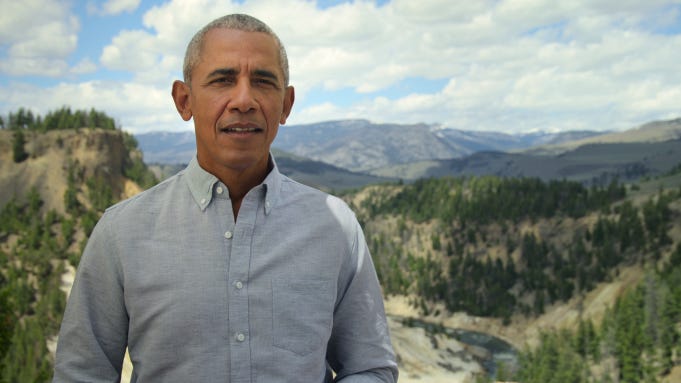
A source close to Higher Ground says the company’s intention was always to start off in their comfort zone — documentaries — before broadening out. Now, they point out, the company is moving into original features with Rustin, about gay rights activist Bayard Rustin, which it developed from the ground up and will be released next year. The company also just announced its first drama series at Netflix — Bodkin, a dark comedy starring Will Forte.
Some lay the lag on Netflix, saying the company has had trouble generating projects for companies with overall deals. Its newness in the space means that it doesn’t have the same well-worn systems of connecting producers with projects and talent the way traditional movie and TV studios do. Higher Ground also isn’t represented by an agency, which would also help connect the dots faster with projects. In 2020, Netflix created a team of execs to specifically work with producers with overall deals at the company.
“Netflix is still figuring out how to be a studio on some level,” says one former Netflix executive. “They’re getting better at it, but there needs to be more cross-pollination. ‘Hey, we have a program that needs somebody who…’ Until the last reorg, there really wasn’t a pipeline for the overalls.”
As for the Obamas, a source says they are very engaged with the company “when they’re needed — talking to them about various projects, giving comments on things the company is doing.” They also still lend their star power, as they did a few weeks ago at the Martha’s Vineyard African American Film Festival for a screening of Descendant, another Participant documentary, like American Factory, that Higher Ground acquired at Sundance in January. When the couple, who had not been announced prior, were introduced at the festival, which takes place near their summer vacation home, Michelle Obama approached the mic and said, “Surprise!” She and the former President then spoke for 15 minutes about the film, which tells the personal stories of descendants of the Clotilda, the last known slave ship to the U.S.
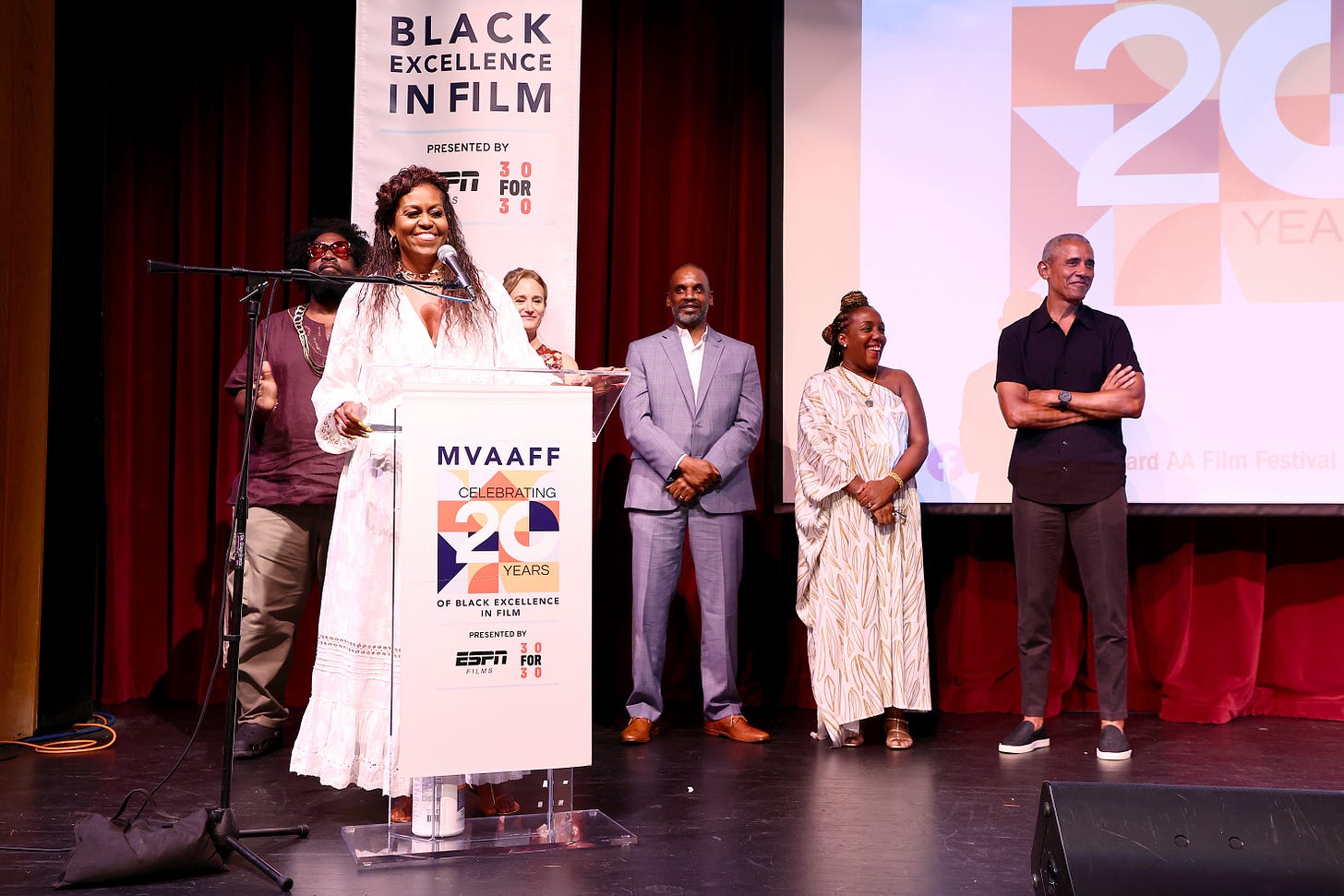
But it is now 2022, not 2018, regardless of appearances at film festivals. Barack Obama’s ill-planned 60th birthday bash inspired Maureen Dowd’s Barack Antoinette column. In many ways, the couple has become part of the plutocracy, which may limit any populist messaging they could have once legitimately authored. This combined with the more ruthless culture of belt-tightening at Netflix puts new pressure on the company. “My sense is, before the pandemic they thought they could do anything they wanted,” says one source who’s worked with Higher Ground. “But now they’re on as tight a leash as anyone.”
Markle’s ‘North Star’
As for Archewell, it has yet to establish itself as a real player in Hollywood, in part because it has yet to define what it is setting out to do. Sources say this stems from Markle, someone who always carefully curated her brand through Instagram posts and her erstwhile blog The Tig — a Goop-like aspirational toolkit touting Henri Bendel doggie bowls, and sustainable crew socks “that plant trees” — but who now finds herself trying to define what her post-Royal, post-working-actress brand actually is.
“She’s terrified of making a decision because she’s so concerned about her image, and so they can’t pull the trigger on anything,” says a source who has spoken with Archewell about its content strategy. “She wants to be seen as this world leader but they don’t have any strong ideas.”
A source close to Markle disputes this characterization saying, “I would say ‘thoughtful’ and ‘cautious’ may be better words than ‘fear.’ Leading by her truth is always her North Star.”
The couple's limbo state doesn’t help. Sure, they abdicated from the House of Windsor — even though Markle’s Zoom name remains “Duchess of Sussex”— yet their cachet still derives largely from being part of the Royal Family or at least adjacent to it. Case in point: scrutiny around their presence at the Queen’s Jubilee (the New York Post reported an anonymous source saying that Netflix must have been upset that there was no photo taken of them with the Queen). But this filament-thin tie to the Royal Family plus their ambition to be do-gooding Davos-style global ambassadors prevents Archewell from even considering any light-hearted or irreverent ideas. “How about a show themed around quitting high-powered jobs?” says the insider. “It’s funny, but they would never consider something like that because they can’t.”
Like Higher Ground, Archewell has recruited strong candidates to fill out its ranks. Ben Browning, a veteran in film finance who hails from FilmNation and worked on the Oscar-nommed Promising Young Woman, runs the media arm of the company. As for PR (which extends to their nonprofit, Archewell Foundation), the couple initially hired Christine Schirmer, the former head of comms at Pinterest and a former comms manager at Apple. She has since transitioned to an advisory role. In May, the company brought on Ashley Hansen, a UTA and NBCU alum, as EVP of Global Communications.
Yet Harry and Meghan’s unrelenting cavalcade of non-Hollywood ambitions and interests affects output. A few weeks after the frantic, all-hands meeting over Pearl, Markle abruptly took off for Uvalde, Texas, to pay her respects to the victims of the elementary school shooting. A week later, she and Harry attended the Queen’s Jubilee (where that photo with the Queen never took place). Meanwhile, Harry is busy playing polo and organizing tournaments in Montecito, where he plays for the Los Padres Polo Team. He’s regularly featured in Instagram pics with pal/teammate Nacho Figueras. There was also that five-month paternity leave in June of 2021 after the birth of daughter Lilibet. Upcoming engagements include a trip to England next month for events in Manchester and London. And Harry just returned from a mini tour of Africa.
“There’s no sense of urgency” at the company, notes one of the Archewell sources.
The source close to Markle says several projects are on the way at Netflix and will launch within a few months. As for the docu-series featuring Harry and Meghan, seen as a juicy follow-up to the couple’s Oprah sit down (and according to one source was the main motivation Sarandos had for making the deal), it is “in the queue.”
A Netflix spokesperson would not comment about the docu-series but says that Archewell projects are indeed on the horizon.
In the meantime, Archetypes is proving to be a sign that Markle may well turn things around. In the first episode of the series, executive produced by Oprah vets Terry Wood and Catherine Cyr, Markle speaks intimately — and candidly — with Williams about stereotypes surrounding female ambition and how, during a Royal trip to Africa, after finding out that the couple’s son Archie had narrowly escaped a fire in his room, she was told to continue on with her speeches.
“There was this moment where I’m standing on a tree stump and I’m giving this speech to women and girls, and we finish the engagement, we get in the car and they say there’s been a fire at the residence. What? ‘There’s been a fire in the baby’s room.’”
“We came back, and, of course, as a mother, you go, ‘Oh my God. What?’ Everyone’s in tears, everyone’s shaken. And what do we have to do? Go out and do another official engagement. I said, ‘This doesn’t make any sense.’”
The episode is “an ambitious podcast in the best way,” says Marc McCrery, founder and CEO of Podtrac, a company that tracks podcast data. “It’s about a big idea and Meghan gives us personal stories and social commentary.”
Nicholas Quah, who writes Vulture’s podcast newsletter, 1.5x Speed, says Archetypes is a huge turning point for Archewell’s podcast endeavor — and for Spotify’s. “I really thought it was not going to come out,” he says. “There’s been a big question about Spotify and whether it’s able to deliver on these big content deals, particularly the quote unquote vanity deals.
“This is going to be a big pivotal point for Spotify. Whether they can actually deliver on something like this… Whether we see more vanity deals is going to depend on this one.” At press time, Archetypes ranked second on Spotify’s top podcasts, behind Rogan; its debut episode with Williams landed the number 15 spot of the most popular episodes list.
Tina Brown, author of The Palace Papers, the juicy tome chronicling the most recent merry mayhem of the Royal Family, warns against counting out Harry and Meghan as Hollywood machers just yet, though suggests they may eventually grow weary of the role. “The trouble with pronouncing on Archewell projects is that a big announcement could render judgment foolish–as in, ‘It’s a shame Huma Abedin has no love life,’ only to find she’s dating Bradley Cooper,” Brown wryly notes.
“I think the Sussexes are beginning to realize the mirage of ‘entertainment deals,’ which are wildly difficult to deliver on as everyone in Hollywood knows. It’s much, much easier to be a Royal, which offers perennial Status without much requirement for Quo.
“Watch for the pivot in a year or two, when the Sussexes feel the calling to return to the U.K. to serve Harry’s country and rejoin the balcony lineup for which front-page coverage is assured.”
End of a Vanity Era?
Netflix and Spotify are not losing quite as much money off high-priced deals that aren’t launching the next Bridgerton than it might appear. At Netflix, producer fees that companies accrue on a series, say, are applied as a charge against their overall guarantee. In other words, no one is getting a $100 million check upfront, whatever the optics are. And at Spotify, payouts are triggered by hitting benchmarks. Sure there are stipends and overhead money, but neither Netflix nor Spotify is as much in the hole for their VIP deals than one might assume.
Still, those optics are there — and they’re not good. When the Obamas announced their Spotify departure in April, it generated as many headlines as did their arrival. And while a Spotify spokesperson diplomatically said, “We’re really proud of partnering with Higher Ground on the series we’ve been able to create with them,” they also pointedly added: “Even though we’ve decided not to move forward with the deal.”
According to sources in both parties, the split was mutual. Over the course of Higher Ground’s deal, the company produced five podcasts, including Renegades: Born in the U.S.A., featuring conversations between Barack Obama and Bruce Springsteen; and The Michelle Obama Podcast. (Consider that Spotify hitmakers like Joe Rogan, controversial as he may be, produces nearly a dozen hours of content a week.) Although Spotify claimed that the First Lady’s series was the most-listened-to Spotify original to date at one point, a Spotify source says Higher Ground “didn’t build any audience at scale to justify our investment. Even the bigger shows didn’t meet our expectations.”
A source close to Higher Ground said the company was unhappy with the marketing at Spotify, which only extended to the shows actually featuring the former President and First Lady, and that Spotify failed to put any promotional muscle behind its other shows. “It was like, ‘Oh, we’ll tweet about it and put up a billboard in a basement.” (In fact, Spotify put up a billboard in Penn Station to promote Tell Them, I am, a podcast with Misha Euceph featuring Muslim voices). They also said that Spotify failed to greenlight many of the shows that Higher Ground pitched. “They were so caught up in their own politics” — namely the Joe Rogan fiasco — “so nothing was getting greenlit.”
Another Spotify source denies this, saying it was in Spotify’s interest to greenlight any shows that seemed like they had potential. And that Higher Ground shows that did get made were promoted “way more than even our studio stuff.”
Podtrac’s McCrery suggests that in some ways vanity podcast deals are set up to fail, particularly at Spotify, whose original deals require exclusivity to the platform. This means that producers lose out on huge traffic potential that can be driven by the likes of Apple, which McCrery says is the highest-driver of podcast traffic.
“Spotify was successful in bringing in Joe Rogan from other platforms and making him exclusive on Spotify. That’s not to say his audience didn’t drop — it did. But it’s an entirely different thing to introduce a new show (that has never existed elsewhere) exclusively on Spotify and have that be successful.”
“Are these vanity collections of celebrities to boost stock price or are they about being a partner with celebrities and helping them understand the space in order to build a sustainable, ongoing business that matches the demand of the market and the revenue potential from advertising?” McCrery asks rhetorically. “Neither of those seem to be in alignment, for either Archewell or Higher Ground.”
For the Obamas, at least, the debate is now moot. In late June, they signed the new, $20 million deal with Spotify rival Audible, which is owned by Amazon. And with Archetypes, Archewell has staved off criticism. At least for the moment.




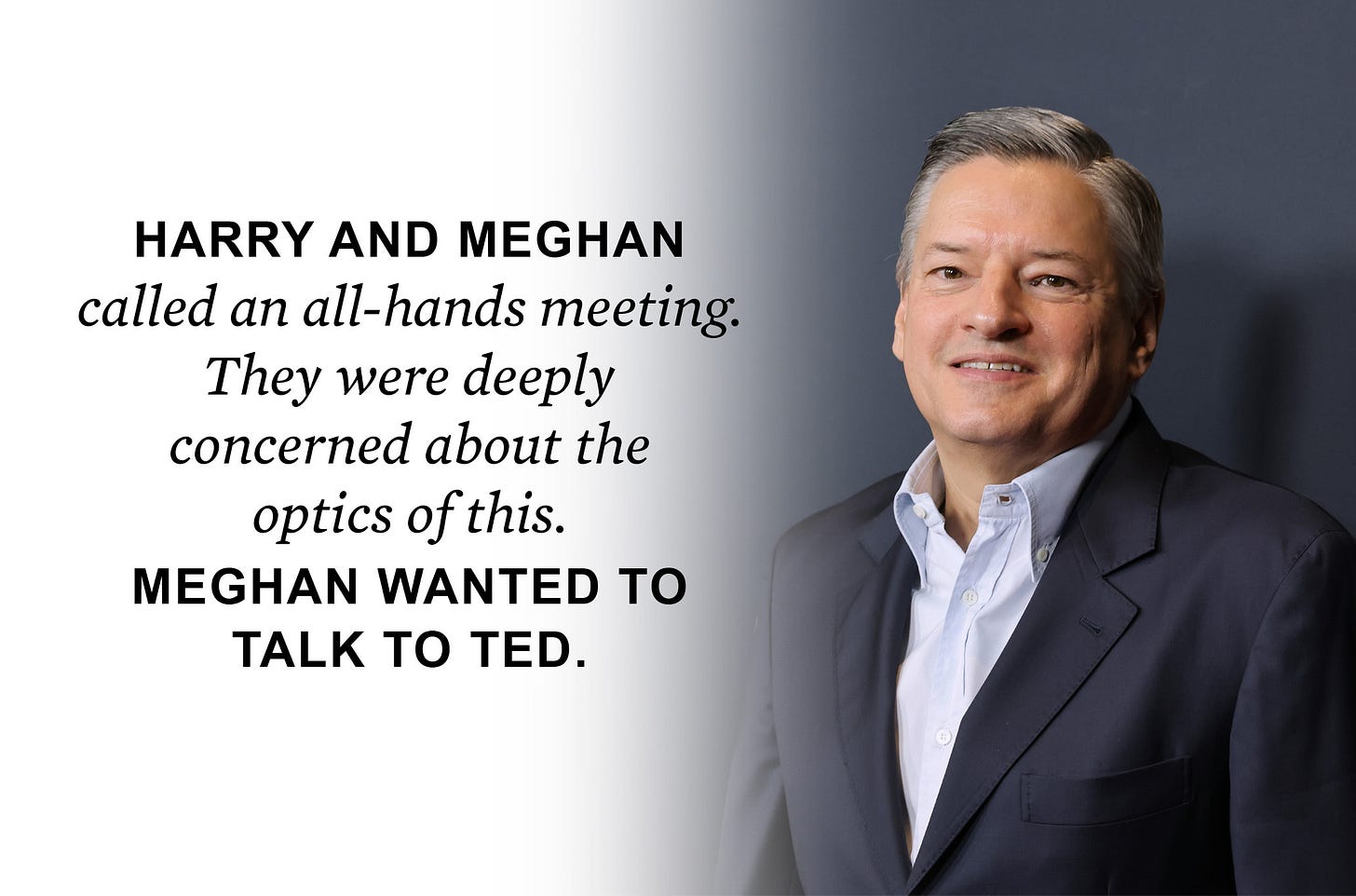

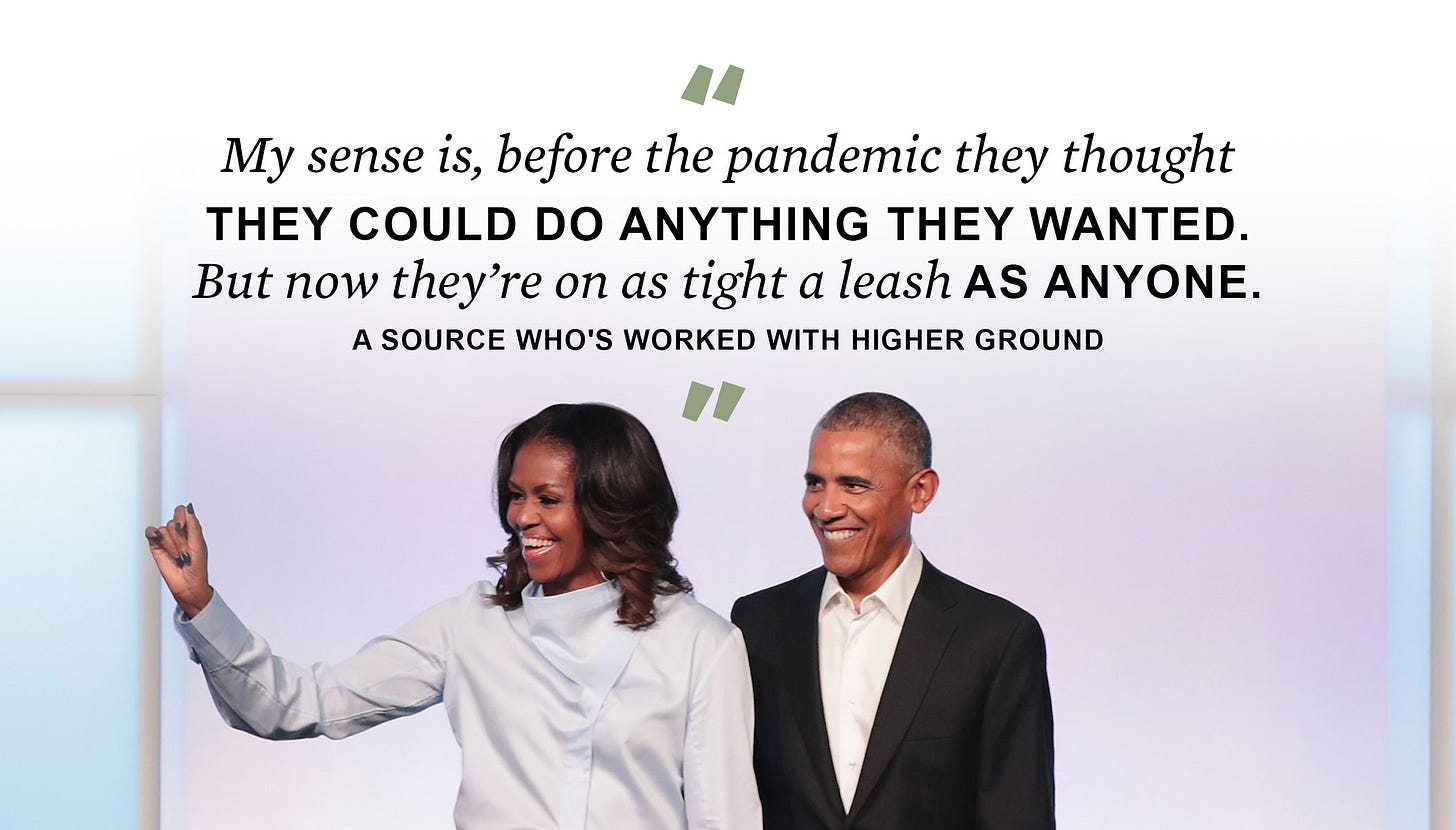
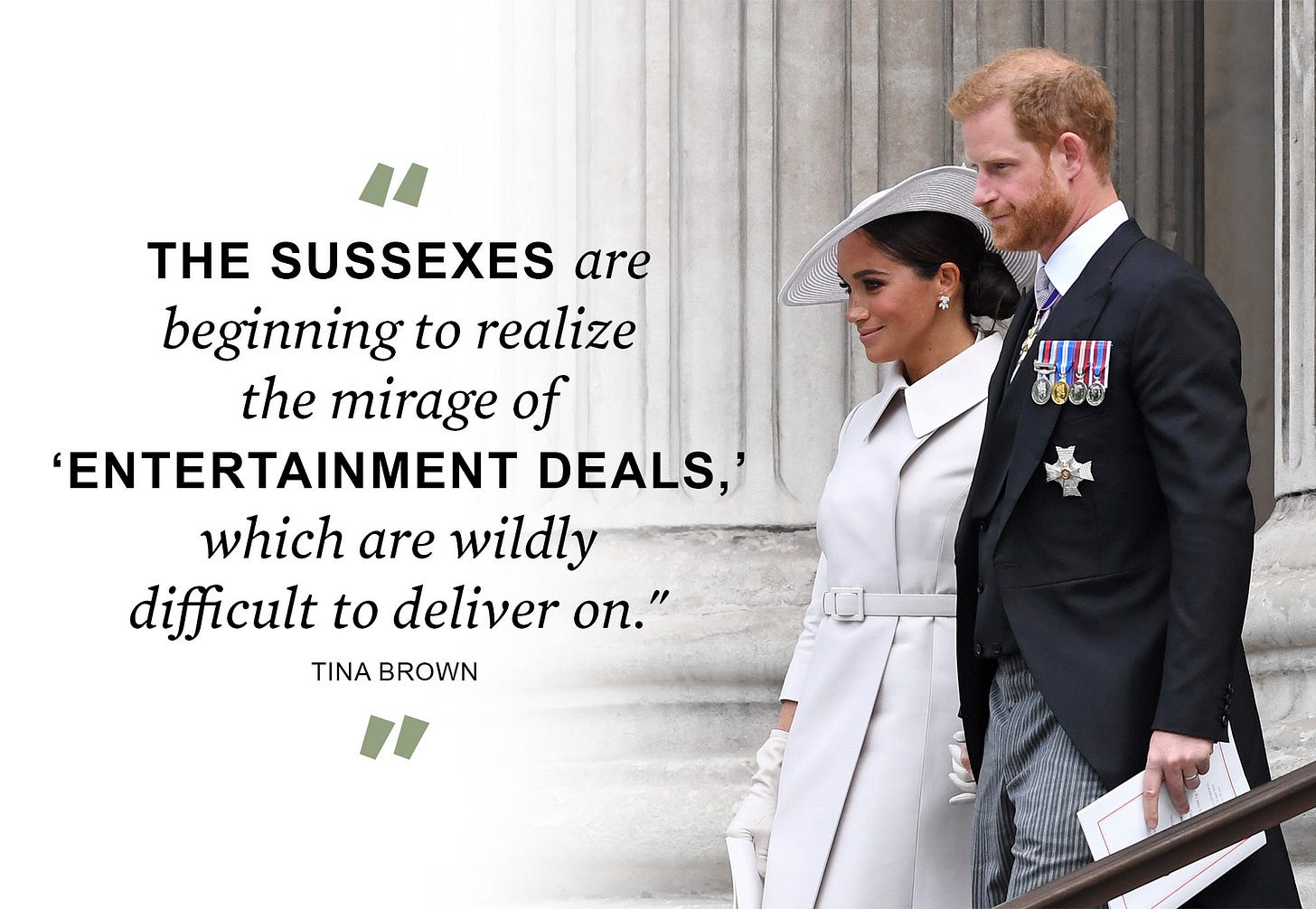


12 [corrected] weeks from last Tuesday takes us to 14 November. Netflix is planning to drop The Crown series 5 before Thanksgiving, though my hunch is they’ll split it in two with a second helping before Christmas. This all means that the window for the Invictus or Harry & Meghan Netflix documentary to drop — assuming it is not going to conflict with the Archetypes launch or when publicity for The Crown S5 is ongoing — is incredibly tight. [Added:] It also means that Harry’s book - if released as planned - will be released to coincide with the Crown S5.
If they end up in a situation where they have to do publicity for Netflix whilst The Crown S5 is also doing the rounds, it will be a huge sign of their reduced leverage and that Netflix wants out. There is - especially in the UK - a point of no return when a celebrity so tarnishes their image that redemption is impossible. Failing to speak out as Netflix gorges on the decline of his parents’ marriage and the death, decay and destruction that resulted from her death (a trauma from which he continues to struggle), could utterly destroy Prince Harry’s personal reputation.
Prepare for turbulence.
They came to do good and did right well.
Maybe Markle can do a show on how to marry a rich guy.